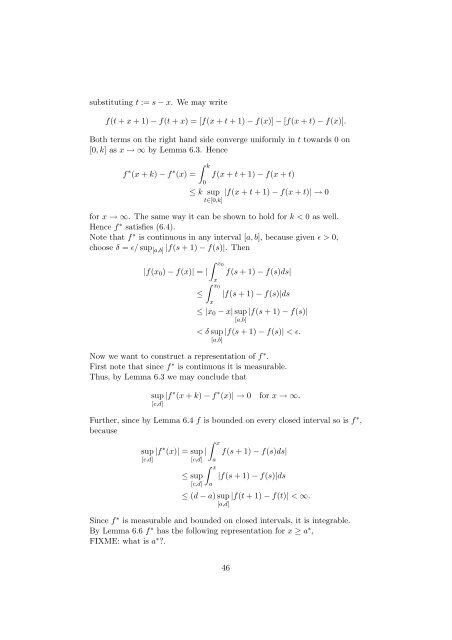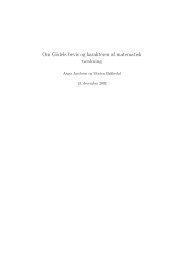Master Dissertation
Master Dissertation
Master Dissertation
You also want an ePaper? Increase the reach of your titles
YUMPU automatically turns print PDFs into web optimized ePapers that Google loves.
substituting t := s − x. We may write<br />
f(t + x + 1) − f(t + x) = [f(x + t + 1) − f(x)] − [f(x + t) − f(x)].<br />
Both terms on the right hand side converge uniformly in t towards 0 on<br />
[0, k] as x → ∞ by Lemma 6.3. Hence<br />
f ∗ (x + k) − f ∗ k<br />
(x) =<br />
0<br />
f(x + t + 1) − f(x + t)<br />
≤ k sup |f(x + t + 1) − f(x + t)| → 0<br />
t∈[0,k]<br />
for x → ∞. The same way it can be shown to hold for k < 0 as well.<br />
Hence f ∗ satisfies (6.4).<br />
Note that f ∗ is continuous in any interval [a, b], because given ɛ > 0,<br />
choose δ = ɛ/ sup [a,b] |f(s + 1) − f(s)|. Then<br />
x0<br />
|f(x0) − f(x)| = |<br />
≤<br />
x x0<br />
x<br />
f(s + 1) − f(s)ds|<br />
|f(s + 1) − f(s)|ds<br />
≤ |x0 − x| sup<br />
[a,b]<br />
|f(s + 1) − f(s)|<br />
< δ sup |f(s + 1) − f(s)| < ɛ.<br />
[a,b]<br />
Now we want to construct a representation of f ∗ .<br />
First note that since f ∗ is continuous it is measurable.<br />
Thus, by Lemma 6.3 we may conclude that<br />
sup |f<br />
[c,d]<br />
∗ (x + k) − f ∗ (x)| → 0 for x → ∞.<br />
Further, since by Lemma 6.4 f is bounded on every closed interval so is f ∗ ,<br />
because<br />
sup<br />
[c,d]<br />
|f ∗ (x)| = sup |<br />
x<br />
[c,d] a<br />
x<br />
≤ sup<br />
[c,d]<br />
a<br />
f(s + 1) − f(s)ds|<br />
|f(s + 1) − f(s)|ds<br />
≤ (d − a) sup |f(t + 1) − f(t)| < ∞.<br />
[a,d]<br />
Since f ∗ is measurable and bounded on closed intervals, it is integrable.<br />
By Lemma 6.6 f ∗ has the following representation for x ≥ a ∗ ,<br />
FIXME: what is a ∗ ?.<br />
46



